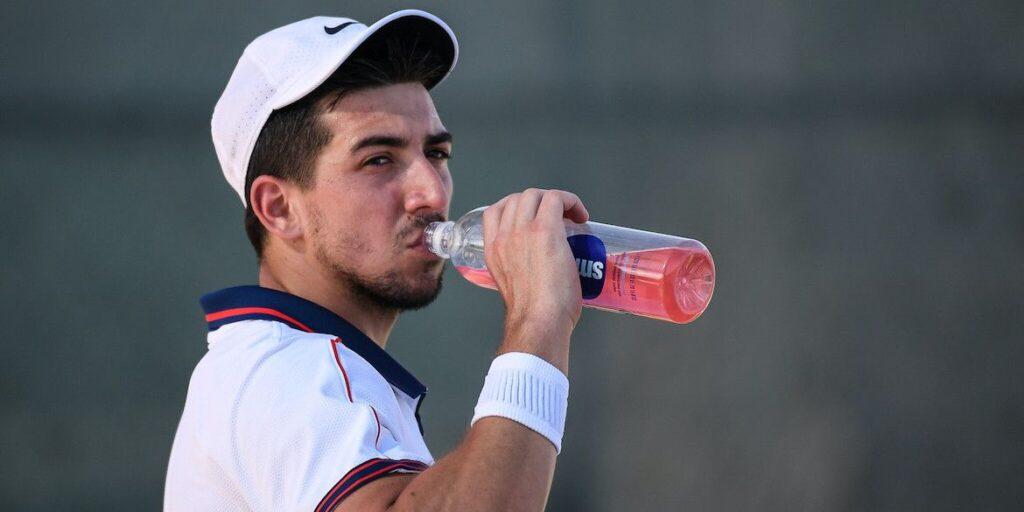Nutrition For Tennis:
Eat and Drink to Win
Knowing what to eat and drink on and off the court can make a difference on the court. Follow these nutrition tips to help you perform like a pro.
Nutrition:
The food you put in your body directly impacts your performance on the court. Focus on whole grains, lean proteins, fruits, vegetables, and healthy fats to play at your best.

Carbs:
Gatorade sports drinks, energy chews, fuel bars, or energy gels; fruit; granola bars; cereal + milk; rice cakes; air-popped popcorn.
Carbs + protein:
Gatorade protein shakes or protein bars; chocolate milk + granola bar; cottage cheese + fruit; hard-boiled egg + pretzels; apple + nut butter; turkey jerky + grapes; bean- or broth-based soup
Carbs + protein + fat:
Sandwich (bread + meat + cheese + veggies); yogurt parfait (Greek yogurt + fruit + granola + nuts); smoothie; hummus + pita chips + veggie sticks; peanut butter & jelly sandwich; breakfast burrito (tortilla wrap + scrambled eggs + cheese + veggies)
Nutrition Strategy for Athletes
An elite tennis athlete needs power, agility and on-court endurance. This requires a nutrition strategy that meets the fuel needs for both endurance and repeated energy bursts. Tennis student-athletes need to focus on daily nutrition habits to ensure adequate recovery and necessary training adaptations. Many collegiate student-athletes struggle with balancing academic responsibilities and proper fueling and hydrating for their sport. Often, they arrive at practice in an under-fueled, dehydrated state. This leads to early fatigue and increases the risk for muscle cramps — and both will inhibit you from performing optimally.

HOW TO FOCUS NUTRITION FOR COMPETITION
Day Before competition: Your eating pattern should be same as your normal routine, with a focus on refueling your muscles with carbohydrates (e.g., fruit, pasta, potatoes, rice, bread, grains).
One to Three Hours Before Bedtime: Eat a small snack that includes carbohydrates and a moderate amount of quality protein (e.g., Greek yogurt, cottage cheese, milk, eggs, chicken).
Hydrate:
• Multiply your body weight (pounds) by 0.6 to 0.7. This is the number of ounces of fluid you should drink the day before competition.
• Drink 16 to 20 ounces of water, sports drink or milk before going to bed.
Electrolytes
• Salt your food or eat salty snacks such as pretzels.
• Get enough electrolytes during the day. Possibly supplement extra electrolytes, if directed by a sports registered dietitian. Your electrolyte needs are specific to you, because people vary drastically in their sodium losses in sweat. Inadequate electrolyte intake can produce muscle spasms, cramping and dizziness.
Day of competition: Eat a pre-match meal about three hours before the match starts consisting mostly of carbohydrates with moderate protein.
One hour before and during competition lasting longer than an hour: Eat easily digestible carbohydrates (e.g., sports drinks, gels, energy chews, low-fiber energy bars).
Hydrate
• Drink 16 to 24 ounces of water or sports drink two to three hours before the match starts. • Drink another 8 ounces 15 to 30 minutes before the match starts. • At every change of ends, drink 8 to 12 ounces of water or sports drink. • Even in a tie-break change, have a few mouthfuls of water or sports drink. • Drink at least 32 ounces of fluids after the match is completed.
Refuel and Repair
• Eat a combination of carbohydrates and protein immediately after the match (within 15-30 minutes). Eat a full meal one to two hours later with a similar composition to the pre-match meal.

